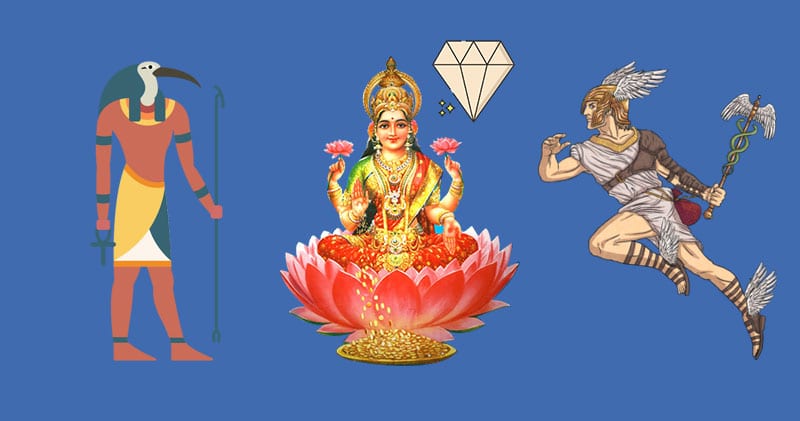
The history of the gods of gambling and gambling in general reaches far back into the mists of time, almost to humankind’s beginnings. People have always loved the adrenaline rush of games of chance. Some ancient cultures even used dice games and throwing coins to settle disputes and earn slaves their freedom.
People often used to turn to the divine inspiration of gambling gods and goddesses before making their bets. Some still continue this tradition to this day. We’ll now look at some of the well-known gods and goddesses of gambling.
Lakshmi – The Indian Goddess of Wealth and Prosperity
Lakshmi is the Hindu Goddess of wealth and prosperity, but she is also linked to Buddhism and Jainism.
Lakshmi is the eternal consort of Vishnu, the most important Hindu god, and is also the source of his strength. After she emerged from the chaos of the primordial ocean, worshippers regarded her as a symbol of good fortune and prosperity.
She can bring luck and wealth, but she despises the greediness they can cause, and she is happy to scorn whoever deserves it. She hid at the bottom of the sea for a thousand years when Indra, the god of war, became too arrogant for her liking. She left him alone, fighting a losing battle against demons.
The gods finally lifted her from the ocean to help defeat the demon attackers after Indra made amends. This tale cautions us that while Lakshmi will reward the deserving, she will also bring a terrible fate to the unworthy and greedy.
Worshippers celebrate Lakshmi on Diwali, the Festival of Lights. Many of her worshippers will try to gamble after the festival, as they believe she will bless them with good luck for their dedication.
If playing at Indian online casino sites perhaps Lakshmi is the god you should turn to.
Hermes – Greek God of Gambling
Gambling has always had a place in Greek mythology. According to the legends, the sky, sea and the underworld were divided between the gods Zeus, Hades and Poseidon after a roll of dice. Hades got the worst roll and thus the last choice of all the gods.
Greek Gambling God Hermes, son of Zeus, is often depicted as a messenger to the gods with winged sandals and a small round helmet. This divine trickster can outwit other gods, and he’s able to move between the mortal and divine worlds. He’s also a conductor of souls to the afterlife and a guide to the Underworld.
Not only is Hermes credited with inventing the alphabet and fire, but he is also said to have invented dice, and gamblers worship him as a god of luck and wealth. He is often prayed to before a game of chance such as slots, roulette, video poker and table games. The outcome of these is usually influenced by a random number generator where contestants bet money on the outcome. Most games of chance require no skill.
The ancient Greeks also identified Hermes with the Egyptian God, Thoth.
Thoth – The Egyptian God of the Moon, Magic Wisdom, Gambling and Time
Thoth, the Egyptian god of wisdom, writing, hieroglyphs, magic, science, art, judgement and the dead, is also said to supervise gambling. Thoth is usually portrayed with the head of an Ibis bird and the body of a man.
As they share similarities, many regard Thoth as the Egyptian counterpart of Hermes. Yet, unlike Hermes, legends say Thoth created himself. During ancient times, they were even worshipped together in the Temple of Thoth in Khemenu.
Ancient Egyptian religious rituals often included the throwing of sticks or pebbles. The number of objects on the ground was then counted to confirm the outcome. An even number indicated a positive outcome and odd a negative one. Historians assume that this form of divination developed into the gambling of today.
Thoth is also said to be the arbitrator of godly disputes, which were often resolved through a game of dice.
Macuilxochitl
Macuilxochitl, or “Five Flower” is the Aztec God of music, dance, flowers and gambling. He is one of five deities of indulgence and excess. He is a highly respected god in this culture, as he has a reputation as a malicious and vengeful deity.
Macuilxochitl is the god who draws the line between reasonable pleasure and excess. He can punish those who anger him with boils, venereal disease and haemorrhoids.
It may seem like a paradox to pray to a God whose duty is to warn about excess, but if you’re going to engage in these acts it’s probably a good idea to appease the one who will be deciding your fate. The Aztecs prayed and sacrificed to Macuilxochitl to stay on his good side.
Nezha
Nezha is a mischievous Chinese god of fortune and gambling. He is often asked for help with gambling and lotteries and is the only Chinese god mischievous enough to reveal winning numbers.
Nezha has a unique and interesting back story. Legends say he was born during the Shang Dynasty after his mother had been pregnant with him for three years and six months. He was born in the body of a small boy and not as a baby.
Ao-Ping, the son of the Dragon King confronted him and there was a battle. Nezha won the fight and killed his enemy.
Ao-Kuang, the Dragon King, demanded revenge, and this lead to Nezha committing suicide to protect and his family. He eventually came back to life to become a demon-slaying hero with his father, Li Jing.
Years later, he went to Heaven as a reward for his past deeds. People on Earth began to worship him and pray for his protection.
Nohoilpi, Navajo God of Gambling
Known as the Great Gambler, Nohoilpi is the Navajo God of Gambling. This god loved games and was always winning at them. He would tempt people and challenge them to games he knew he would win.
Nohoilpi wears a huge turquoise talisman, the lucky charm of a gambler.
According to Navajo legend, Nohoilpi came to earth to teach gambling to men. He soon fared better at the games than all men, and started winning their wives and children, their properties and sometimes even the men themselves.
The people continued gambling with Nohoilpi, even after sustaining severe losses. People came from great distances to gamble with the god, who got extremely arrogant after winning bet after bet.
Nohoilpi used these enslaved people to build a city in his honour. Other Navajo gods noticed this abuse of power and devised a plan to teach him a lesson.
During a magical night, Navajo gods gave an ordinary man special powers to beat Nohoilpi at gambling and win the freedom of the slaves. With the gods’ help, the man won, and Nohoilpi was stripped of all his belongings and sent away into the sky. The enslaved people were freed.
This tale cautions every gambler that there are consequences for greed, and not even a god of gambling is safe from them.
Papa Legba
Papa Legba is the voodoo god who stands at the spiritual crossroads. He appears as an older man wearing a hat and walks with a cane. Sometimes he has a guitar, a deck of cards or a bottle of water.
Approach Papa Legba at the crossroads if you want to make a deal. He is exceedingly fond of gambling, especially cards. He also appreciates gifts of tobacco from his followers.
According to legend, Papa Legba gives or denies permission to speak with the spirits. He also speaks all human languages. Legba is also the god of speech, understanding and communication.
Fortuna – Goddess of Fate, Luck and Abundance
Fortuna is the Roman goddess in charge of luck and fortune. She’s usually depicted with the wheel of fortune, a rudder and the horn of plenty. Her name has led to the English sayings of fortune and fate, such as “May the odds be ever in your favour”.
Fortuna’s also the one that may grant you a little bit of luck when you buy that lottery ticket.
Tyche
The Greek version of Fortuna, the goddess Tyche blesses people with good, and sometimes bad fortune. Hesoid, a Greek poet, called her a daughter of Oceanus and Tethys, but according to other writers the supreme Greek God, Zeus, is her father.
She is usually shown wearing a crown, winged, with a sceptre and cornucopia. Tyche sometimes appears blindfolded with different devices that represent uncertainty and risk.
Tyche acts a moderating influence. The goddess is also associated with Agathos Daimon, a good spirit that protects people and families, as well as Nemesis who punishes men who are too prosperous.
One of her monuments is a temple in Argos, where the first set of dice that was invented by Palamedes was dedicated to her.
Lofn, Goddess of Games
Lofn is a Norse goddess of love, but gamblers also call on her for luck or recovery from gambling addiction. She is one of the lesser-known inhabitants of Asgard.
She may bless the bold with good luck. People play games in her honour and adapt card games to have a “ghost player” so that the goddess can join in the fun.
Final Thoughts
When you find yourself in a casino with beautiful Greek, Hindu or Egyptian-themed slot machines, or you’re playing online games with these designs, take a moment to remember the rich history of those cultures. It’s fascinating to reflect on how the gods of gambling continue to influence modern punters.
Maybe you want to say a silent prayer to one of these influential gods in the hope of winning the next jackpot? Here’s hoping the gambling gods will bless you with the best of luck for your next play session.
For more content like this make sure to check out our gambling blog!
